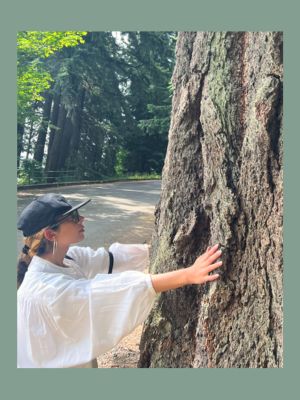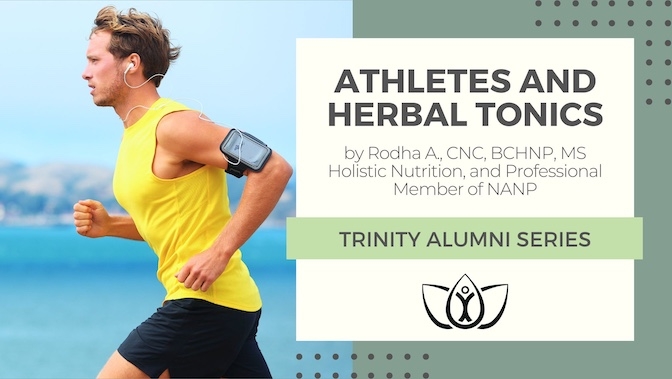 Do herbs help out before or after a workout? The simple answer is yes. Whether you enjoy a 30-minute pilates workout, run a marathon, or practice martial arts, herbs can support your efforts. Plants have constituents that energize, replenish nutrients, heal joints or ligaments, and help prevent oxidative stress that can lead to cellular damage. It's important to discuss oxidative stress with athleticism. Since athletes burn more oxygen, free radicals can be released in addition to those that come from common environmental toxins, resulting in an overloaded immune system. Even though some stress is good for the body, a build-up of oxidative stress can cause much damage. As a result, the body can be overwhelmed as oxidative stress eventually leads to inflammatory diseases. So, for the sake of balance, this article will discuss some essential herbs that can help the body heal and prevent oxidative stress while also providing stamina, clarity, and an overall enhancement in athletic performance.
Do herbs help out before or after a workout? The simple answer is yes. Whether you enjoy a 30-minute pilates workout, run a marathon, or practice martial arts, herbs can support your efforts. Plants have constituents that energize, replenish nutrients, heal joints or ligaments, and help prevent oxidative stress that can lead to cellular damage. It's important to discuss oxidative stress with athleticism. Since athletes burn more oxygen, free radicals can be released in addition to those that come from common environmental toxins, resulting in an overloaded immune system. Even though some stress is good for the body, a build-up of oxidative stress can cause much damage. As a result, the body can be overwhelmed as oxidative stress eventually leads to inflammatory diseases. So, for the sake of balance, this article will discuss some essential herbs that can help the body heal and prevent oxidative stress while also providing stamina, clarity, and an overall enhancement in athletic performance. Herbs have been used since the times of gladiators, and ancient civilizations went to lengths to reap what the land could provide for their strength and athletic performance in combat or their hardships of living. As we return to our roots, we should also consider using herbs for athletic purposes. Herbs like rosemary, for instance, a circulatory herb, and Tarragon invigorate oneself from fatigue and physical exertion. Other herbs in the adaptogenic class help the body adapt to its needs. For example, Siberian ginseng (Eleuthera) improves cardiorespiratory fitness and fat metabolism, resulting in better endurance performance. Due to its vascular relaxant action, Russians have also used Siberian ginseng as a focus herb. Tulsi is a wonderful Ayurvedic herb that is known to be used to support intense training. Adding Tulsi to any athlete's regime helps the body reduce stress responses like insulin sensitivity and cortisol production while simultaneously directing energy into necessary bodily needs like digestion or the immune system function.
Hibiscus and Rose hips are potent antioxidant herbs that are a perfect addition to any athlete's routine during or after a workout. During a workout, these herbs can help the body stay hydrated since both contain essential minerals and electrolytes. After a workout, their high vitamin C content helps balance oxidative stress. Additionally, the high anti-inflammatory constituents of hibiscus help reduce post-exercise swelling and speed up recovery. Nettle leaf is well known for supporting someone with allergies, and it's a great source of plant protein, but did you also know that when drinking nettle leaf, you are soothing your nervous system, supporting healthy joints and bones, and hydrating your body with electrolytes? Keep in mind that nettle is a dry herb, so if you are usually dry, it's a good idea to pair it with a moistening herb like marshmallow root or simply aloe.
Everyone can use extra support after a workout, and with a few tweaks to your athletic routine, you can naturally reduce soreness and nourish your body with herbs.
Now, for hydration, thirst must be assessed inwards and outwards. Have you ever heard someone say, "I drink water, but I still feel dehydrated"? The answer is electrolytes, the minerals in a hydrating beverage that help quench your thirst. Water is great, but if you are an athlete getting regular exercise, you're likely sweating massively, and with that, you lose minerals, too. When we sweat, we must replenish the body with what has been lost to improve performance, both while working out and at rest. So, an herbal tonic is an ideal hydration drink before, after, or even during a workout to help your body build muscle, pump blood, and keep your nervous system working optimally.
Some advantageous herbs are listed above that you can add to your routine depending on your needed body support, duration, or workout of choice. Now, let's dive deeper into the subject of oxidative stress and how it affects athletes. The answer is connected to inflammation and chronic diseases, according to a study conducted by the Asian Journal of Sports Medicine. The study explains that a person with an active lifestyle, which applies to an athlete, has an overproduction of reactive oxygen and nitrogen species, and so exercise-induced oxidative stress and damage can lead to inflammation by overworking the immune system. Usually, the immune system is signaled to remove free radicals; however, athletes burn more oxygen and create more free radicals, so this overload may cause chronic inflammation, which can lead to forms of disease.
For this reason, adding antioxidants in the form of herbal tonics or herbal drinks is essential to fight free radicals and help avoid possible health issues that might occur in the long run. Staying active enhances the circulatory and skeletal muscular system, yet on the other hand, if oxidative stress is not relieved, it might interfere with a supposedly fit physique internally. But, we can manage it by adding herbs that are high in antioxidants and, of course, a diet rich in fruits and vegetables. In addition to the previously mentioned, some often overlooked herbs high in antioxidants, which athletes should consider, are Goji berries and cinnamon. Goji berries are high in vitamins C and A, so their addition can reduce inflammation and support the circulatory system. Cinnamon, a warming spice, is also excellent for waking you up and giving you a boost of heat before you even start your warm-up. Cinnamon also contains free radical scavenging constitutes.
As an athlete, will you consider adding herbs to your routine? I heard a yes somewhere! So, kudos to you. Herbal infusions or botanical mixes pre- or post-workout can help keep the body functioning optimally without injuries, achieving better endurance, plus providing heaps of clarity and focus.
Try these botanical mixes for athletes.
Before or During a Workout:
- An infusion of hibiscus on its own with a sweetener like honey
- Hibiscus with rose hips
- Hibiscus with goji berries
- Rose hips and cinnamon
- An infusion of peppermint and licorice – Adding lemon or lime does the trick if you fancy a tangy taste. Usually, licorice root is the sweetener, but you could add honey.
After a Workout:
- Peppermint and lemon balm or oat straw
- Tulsi on its own or with Goji berries
- Tulsi and hibiscus
- Nettle and aloe or marshmallow root
The answer to healing from within is understanding how the body works. When we do that, we honor our system by giving it the necessities to flourish and provide for us in return. It's a give-and-take sort of equation when it comes to the health of the body, mind, and soul. Where are you at solving the equation?
References
Kuo, J., Chen, K. W. C., Cheng, I. S., Tsai, P. H., Lu, Y. J., & Lee, N. Y. (2010). The Effect of Eight Weeks of Supplementation with Eleutherococcus senticosus on Endurance Capacity and Metabolism in Human.
The Chinese Journal of Physiology, 53(2), 105-111. https://doi.org/ 10.4077/CJP.2010.AMK018
Meamarbashi A. (2017). Herbs and natural supplements in the prevention and treatment of delayed-onset muscle soreness. Avicenna journal of phytomedicine, 7(1), 16–26.
Yavari, A., Javadi, M., Mirmiran, P., & Bahadoran, Z. (2015). Exercise-induced oxidative stress and dietary antioxidants. Asian Journal of Sports Medicine, 6(1), e24898. https://doi.org/ 10.5812/asjsm.24898
About the Author

Rodha A. Nutrition Consultant,
BCHNP, MS Holistic Nutrition, &
Professional Member of NANP
How many can say a name that is given to you ended up representing your whole character and lifelong passion. My name is Rodha/Rhoda which means paradise gardens and how magical I find it that eventually, through my path I came back to my roots, literally. I started out studying arts and psychology, which shaped my thinking and understanding as I discovered that nutrition and holistic health were more than just something I was curious about. It helped me heal and understand health from a favorable point of view. So, I took a step ahead into studying wellness professionally and from there obtained a degree in MS holistic nutrition. I have worked in several fields, such as awareness, sustainability, design, mentoring, research, quality management, and freelancing in my small business as a nutrition counselor and content creator for my page. What I love to believe is that, if I have the gift to help others investigate their health while filling in the dots brings them some form of ease, then I’m doing something exceptional. Here is my social account if you wish to connect I would love that: https://www.instagram.com/u.apotheka/

This article was reviewed by Lauren Ameling, DC, BCND. Dr. Lauren Ameling is a 2006 graduate of Logan University, where she earned a Doctor of Chiropractic and a Bachelor of Science in Human Biology. She is a chiropractic physician certified in acupuncture and naturopathy, specializing in traditional Chinese medicine, pregnancy and pediatric care, and kinesiology. Dr. Ameling has worked in healthcare education since 2010 and serves as the Chief Operating Officer of Trinity School of Natural Health.

